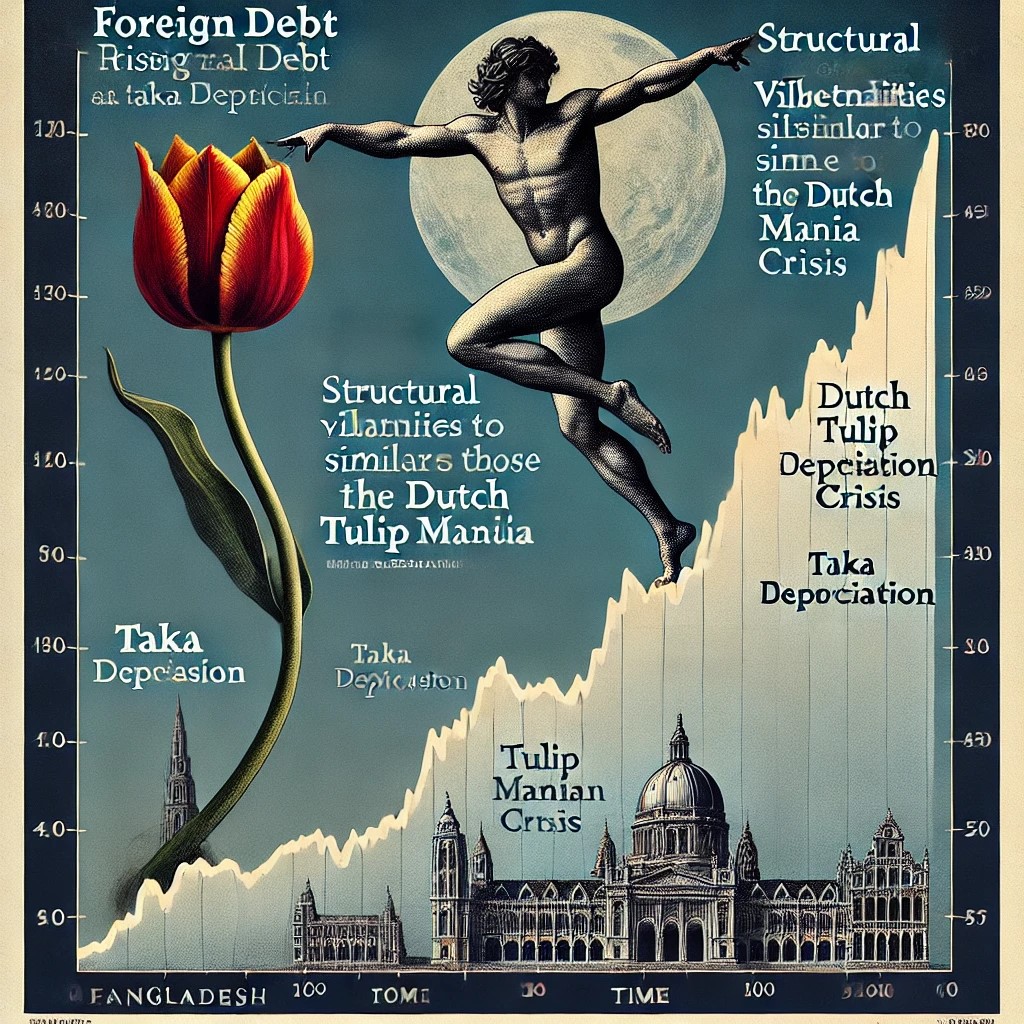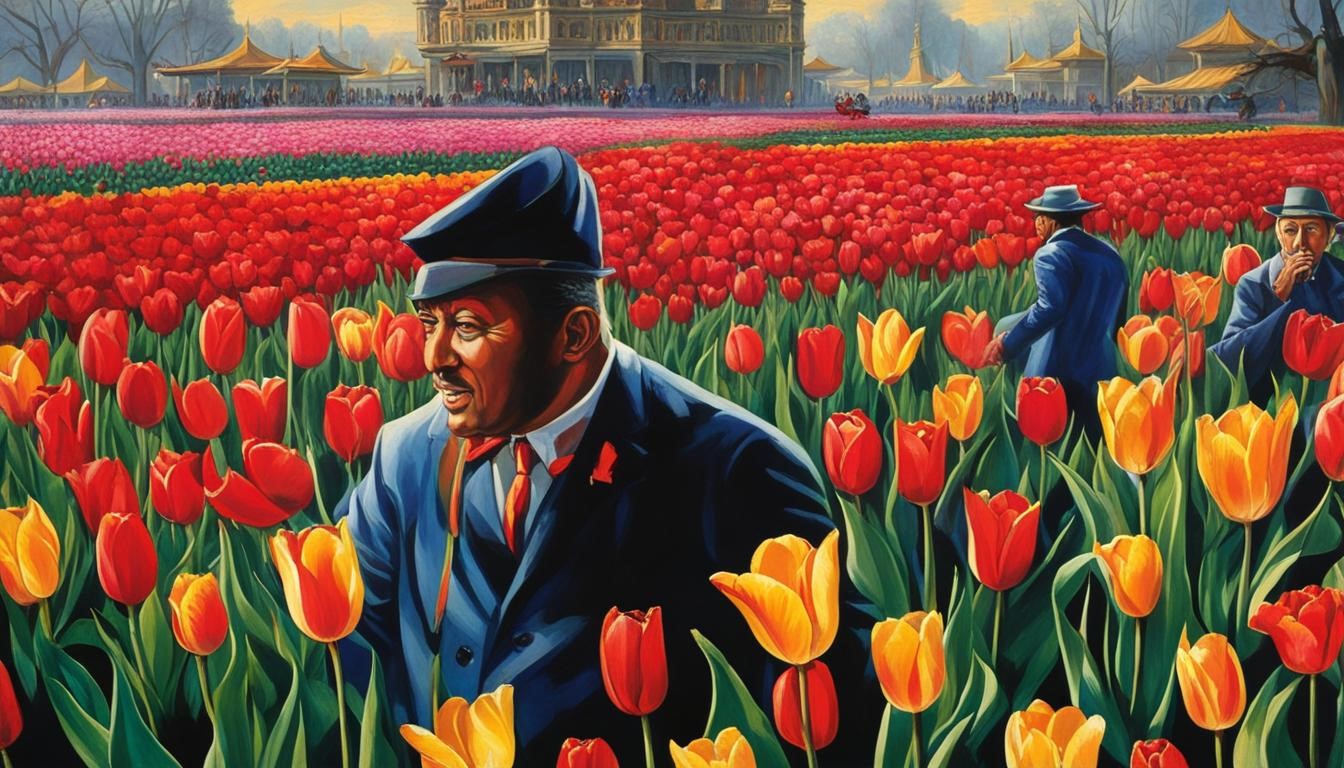
Written by:
AKM SAYEDAD HOSSAIN
Executive Director
National Institute of Global Studies (NIGS),
A Bangladesh-based think tank
https://nationalinstituteofglobalstudies.com
The tale of Tulip Mania in 17th-century Netherlands remains one of the most infamous examples of speculative excess in economic history. At its peak, the price of a single tulip bulb reached astronomical levels—equivalent to the value of an entire house—only for the market to collapse abruptly, leaving thousands financially ruined. While centuries apart, the underlying causes and consequences of Tulip Mania find striking parallels in Bangladesh’s current economic landscape.
(A historic painting of Tulip Mania in 17th-century Netherlands: A vivid depiction of Tulip Mania in the 17th century, when speculative excess drove the price of tulip bulbs to astronomical levels, only for the market to collapse.)
In this analysis, we explore how Bangladesh’s stock market volatility, real estate boom, and rising foreign debt reflect patterns reminiscent of Tulip Mania. By understanding these parallels, we can assess whether the Bangladeshi economy is at risk of a similar speculative collapse and explore strategies for ensuring long-term economic stability.
Understanding Tulip Mania: The Birth of Economic Bubbles
Tulip Mania, which unfolded between 1634 and 1637, was fueled by a speculative frenzy surrounding rare tulip bulbs in the Netherlands. What began as a fascination among the elite quickly spread to ordinary citizens, with people from all walks of life buying tulip bulbs in hopes of making a fortune. At its height, the most coveted tulip bulbs sold for more than ten times the average annual wage of a skilled worker.
This speculative boom was characterized by key factors such as the overvaluation of assets, market illiquidity, and a sudden collapse. Prices were driven by investor speculation rather than the intrinsic value of tulip bulbs. Many transactions occurred through futures contracts, where buyers and sellers traded on promises rather than physical goods. When confidence in the market evaporated in February 1637, prices plummeted, leaving investors bankrupt. This episode revealed how greed, herd mentality, and poor regulation can create and burst economic bubbles—an enduring lesson for modern economies.
Comparing Bangladesh’s Economy with Tulip Mania
Bangladesh has emerged as a rising economic force in South Asia, achieving impressive GDP growth and industrial expansion. However, beneath this growth lies a fragile foundation marked by overleveraged sectors and speculative behaviors. Three areas in particular—the stock market, real estate, and foreign debt—exhibit symptoms of a speculative bubble akin to Tulip Mania.
Stock Market Volatility: A Speculative Playground
Bangladesh’s stock market, particularly the Dhaka Stock Exchange (DSE), mirrors the structure of Tulip Mania in several ways. The DSE has experienced dramatic fluctuations, most notably the 2010–2011 stock market crash, which saw share prices surge by 62% before collapsing by 50%, wiping out billions of taka in investor wealth. Similar to Tulip Mania, overvalued assets and rampant speculation fuel these booms and busts.
Much like the “wind trade” of tulip futures, the stock boom in Bangladesh is often driven by borrowed money through margin trading, amplifying risks if market sentiment shifts. The concentration of investment in a handful of blue-chip stocks further increases market vulnerability. Regulatory lapses, including weak enforcement against insider trading and price manipulation, undermine market confidence. If political turmoil or global economic shifts trigger a sudden shock, the resulting collapse could devastate small investors.
Real Estate: A Bubble in the Making?
The real estate sector in Bangladesh, especially in urban centers like Dhaka and Chattogram, has experienced staggering price increases over the past decade. Land prices in these cities have surged by 300%, making housing unaffordable for many middle-class families. This boom is reminiscent of the speculative excesses of Tulip Mania.
Luxury housing developments dominate the market, while affordable housing remains neglected. A growing number of properties remain unsold or unoccupied, suggesting that investments are driven by speculation rather than genuine demand. Many property purchases are financed through loans, increasing the risk of default if prices decline. If the real estate bubble bursts, it
could destabilize the financial system by increasing non-performing loans (NPLs) and causing a credit crunch, echoing the collapse of tulip prices in 1637.
Foreign Debt and Currency Devaluation: Structural Weaknesses
Bangladesh’s external debt exceeds $100 billion, with the burden increasing due to the depreciation of the Bangladeshi Taka (BDT). Rising global interest rates further escalate the cost of debt repayment, posing a significant challenge for the economy. As with the Dutch economy during Tulip Mania, the heavy reliance on external borrowing creates vulnerabilities that could lead to a systemic crisis.
The Taka’s depreciation against the U.S. dollar fuels inflation and erodes purchasing power, increasing economic uncertainty. Overdependence on remittances and textile exports leaves Bangladesh susceptible to external shocks. A sudden withdrawal of foreign investment could trigger a balance-of-payments crisis, pushing the economy into deeper turmoil.
The Psychological Dimension: Fear and Greed Drive Both Economies
Both Tulip Mania and Bangladesh’s current economic risks are fueled by emotional investing. In both cases, investors chase unrealistic returns, believing that prices will continue rising indefinitely. Herd mentality drives people to follow the crowd rather than conduct rational analysis, while overconfidence fosters the belief that “this time is different.” These psychological drivers make speculative bubbles self-reinforcing until the first signs of weakness cause panic and collapse.

Lessons for Bangladesh’s Future Stability
To avoid a modern-day replay of Tulip Mania, Bangladesh must adopt proactive policy measures. Strengthening financial regulation is crucial to prevent manipulation and excessive speculation. Diversifying the economy by reducing reliance on the garment sector and promoting tech innovation, pharmaceuticals, and agriculture can create a more resilient economic foundation. Enhancing financial literacy will empower retail investors to make informed decisions and reduce speculative behavior. Sustainable debt management, including limiting external borrowing and improving foreign reserve management, is essential to withstand global shocks.
Can Bangladesh Avoid Its Own Tulip Mania?
While Bangladesh’s economy remains fundamentally stronger than 17th-century Holland, the warning signs of a speculative bubble—particularly in the stock market and real estate sector—are impossible to ignore. Without proactive policy intervention and prudent economic management, the country risks a modern-day replay of Tulip Mania’s tragic end.
By learning from the mistakes of history and embracing sustainable growth strategies, Bangladesh can preserve its economic progress and avoid the devastating consequences of unchecked speculation.




